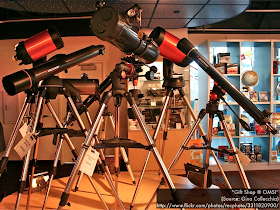Cuesta College, San Luis Obispo, CA
Students have a weekly online reading assignment (hosted by SurveyMonkey.com), where they answer questions based on reading their textbook, material covered in previous lectures, opinion questions, and/or asking (anonymous) questions or making (anonymous) comments. Full credit is given for completing the online reading assignment before next week's lecture, regardless if whether their answers are correct/incorrect. Selected results/questions/comments are addressed by the instructor at the start of the following lecture.
The following questions were asked on reading textbook chapters and previewing presentations on reviewing the history of astronomy, Kepler's and Newton's laws, and telescope powers.

Selected/edited responses are given below.
Describe something you found interesting from the assigned textbook reading or presentation preview, and explain why this was personally interesting for you.
"Newton's cannon, because that would be pretty awesome if that was possible."
"That overall magnification is not always that important when purchasing an optical telescope. Before taking this class I would have thought that magnification would have played a much greater role in selecting a telescope."
That there seems to be two different sets of laws; one set consists of explaining the 'how' and the other set the 'why' for the motion of the planets, which is actually something I have been wondering about."
Describe something you found confusing from the assigned textbook reading or presentation preview, and explain why this was personally confusing for you.
"The difference between prograde and retrograde motion."
"There is a lot of information about the telescopes so it's hard to keep track of it all in my mind."
"The three different powers that 'rate' a telescope."
"Kepler's laws were confusing. I didn't at all understand what they were."
When a planet is undergoing retrograde motion, over several nights it moves __________ with respect to the background stars.
east to west. ***** [5] west to east. ******* [7] (Either of the above choices is possible.) ** [2] (Unsure/lost/guessing/help!) **** [4]
When a planet is undergoing prograde motion, over several nights it moves __________ with respect to the background stars.
east to west. ******* [7] west to east. ******* [7] (Either of the above choices is possible.) [0] (Unsure/lost/guessing/help!) **** [4]
Categorize each of Kepler's laws.
(Only correct responses shown.)
Kepler's first law: describes the shape of a planet's orbit. [78%]
Kepler's second law: describes the motion of a planet along its orbit. [72%]
Kepler's third law: describes the motion of a planet along its orbit. [56%]
Categorize each of Newton's laws.
(Only correct responses shown.)
Newton's first law: relates forces with changes in motion. [61%]
Newton's second law: relates forces with changes in motion. [67%]
Newton's third law: describes a property of forces. [61%]
The __________ powers of a telescope depends on the: (Only correct responses shown.)
light-gathering power: diameter of the primary lens/mirror [39%]
resolving power: diameter of the primary lens/mirror [28%]
magnifying power: both the focal lengths of the primary lens/mirror and eyepiece: [66%]
The least important feature to consider when purchasing an optical telescope is the __________ of its images.
brightness. *** [3] resolution. [0] magnification. ************ [12] (Two of the above choices.) [0] (Unsure/lost/guessing/help!) *** [3]
Briefly explain your answer for the least important feature to consider when purchasing an optical telescope.
"A telescope's main purpose is to pull in light and make tiny things appear brighter; therefore, light gathering and diameter of the scope are most important."
"There is no point in zooming in on something if it is dim or fuzzy."
"The least important part of the optical telescope is magnification. This is the least important because higher magnifying power doesn't always provide you with more detail."
"Brightness and resolution can't improve after buying the telescope. Magnification can be improved by buying a different eyepiece."
Ask the instructor an anonymous question, or make a comment. Selected questions/comments may be discussed in class.
"Will there be a study guide for the midterms?" (Yes, there will be both study guides and in-class review sessions for the midterms.)
"Will we get the chance to look through telescopes at some point during this class?" (This Thursday.)
"PLEASE EXPLAIN TELESCOPES, PLEASE." (THIS THURSDAY.)
"Can you please go over everything we were assigned to read."
"Loved the history section! Copernicus and Aristotle are supercool!"
"Since I've started taking this course, I have noticed that when the moon and stars come out, I catch myself looking up at the sky a lot trying to point different things that I have learned! Thanks! :)"
No comments:
Post a Comment